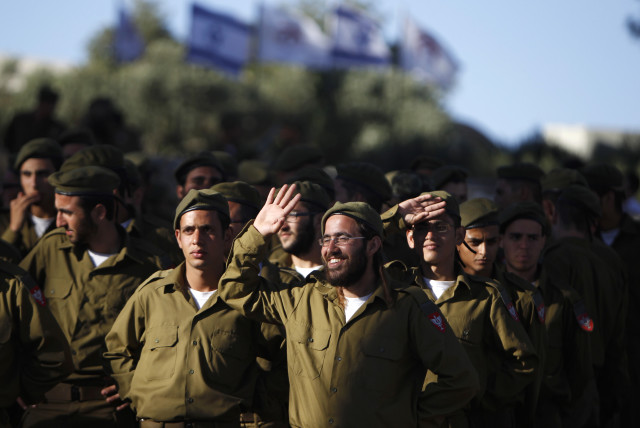Numbers aside, haredi conscription is about the fabric of Israeli society - editorial

The haredi community must find a way to contribute more directly to the defense of the nation, whether through military service or other forms of national service.
In the latest chapter of Israel’s long-standing debate over haredi conscription, Defense Minister Yoav Gallant and minister-without-portfolio Benny Gantz have expressed outrage at the government’s efforts to push forward a controversial draft bill. Prime Minister Benjamin Netanyahu’s attempt to revive a version of the conscription law – initially proposed by Gantz in 2022 – has ignited fierce resistance, underscoring deep divisions within Israeli society and government.
The proposed law seeks to address the conscription of haredi (ultra-Orthodox) men into the IDF, a contentious issue since 1948. On the one hand, proponents argue that every Israeli citizen should share the burden of national defense, emphasizing the principle of equality and the growing security needs of the country. Critics of the current system highlight the significant strain on those who serve, both in terms of increased responsibilities and economic burdens. Attorney-General Gali Baharav-Miara has stressed that without a conscription law for yeshiva students, the principle of equality is undermined, and this situation is legally unsustainable.
Political and religious landscape
Opponents among the haredi community argue that mandatory military service would disrupt their religious studies and way of life. They maintain that their spiritual contribution is vital to the nation’s well-being. Haredi leaders also fear that conscription could lead to cultural assimilation and erode their religious identity.
The government’s attempt to navigate these conflicting interests has created a complex political landscape. Gantz criticizes the current bill, as it fails to address the IDF’s needs, especially following recent conflicts that have significantly increased operational demands.

Despite these challenges, some haredi voices acknowledge the need for compromise. Recent polls indicate that a significant portion of the haredi community believes those not engaged in full-time Torah study should serve in some capacity, whether in the IDF or through national or civil service. This reflects a growing recognition that the haredi community must contribute more directly to national security.
The current government’s proposal includes significant changes to address these concerns. The draft bill seeks to lower the age of permanent exemption from 26 to 22, aiming to integrate haredim into the workforce sooner and reduce the inequality in military service. This proposal also includes increased benefits for those serving in mandatory and reserve duties, an attempt to balance the scales.
However, the debate rages on, with significant opposition from both within and outside the government. Critics argue that the bill falls short and does not address the IDF’s true needs, particularly in light of recent conflicts. They claim that the bill is more about political maneuvering than addressing national security concerns.
Supporters of the bill argue that it is a vital step towards integrating the haredi community into broader Israeli society. They point out that many in the community are already willing to serve in some capacity, whether through shortened military service or national civilian service. The bill would create a framework that allows for this integration while respecting the religious commitments of those who wish to continue their studies.
Ultimately, the issue of haredi conscription is about more than numbers; it concerns the very fabric of Israeli society. The current situation, where a significant part of the population is exempt from service, creates a sense of inequality and resentment among those who do serve.
As Israel continues to face significant security challenges, the need for a comprehensive and equitable conscription law becomes ever more urgent. The proposed bill – while not perfect – represents a step in the right direction. The government, the haredi community, and the broader Israeli society need to work together to find a solution that balances the national security needs with the religious commitments of the haredi community.
The stakes are high, and the need for more soldiers is clear. The haredi community must find a way to contribute more directly to the defense of the nation, whether through military service or other forms of national service. A balanced and fair conscription law that addresses the concerns of all parties is essential for Israel’s future security and social cohesion. Israel needs more soldiers – it is time for the haredi community to step up and do their part in securing the nation’s future.
